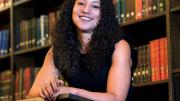Elizabeth Hinton’s fascination with the past started early. “As a little girl, I used to ask my parents to tell me about what I called then ‘the olden times.’” One central piece of family history concerned their decision to leave Georgia in the early 1940s. One night, a white man sat down far to the rear of an otherwise empty bus, and when Hinton’s grandfather refused to change his own seat, the bus driver pulled out a gun. Eventually, her grandfather found a job in Michigan, where Hinton grew up. “I like to say I was born in Ann Arbor, came of age in New York”—she studied at NYU and Columbia—“and now I’m coming into myself in Boston.” In 2014, she joined Harvard’s history and African and African American studies departments as an assistant professor. Behind her desk, posters of McGruff the Crime Dog glare at visitors—a fixture of public-service announcements, billboards, and TV commercials in the 1980s, when he exhorted citizens to “Take a bite out of crime.” Hinton’s recent book, From the War on Poverty to the War on Crime, draws on government archives and a flurry of Freedom of Information Act requests to trace mass incarceration in the United States back to the Johnson administration. “Some of the first feedback I got on what would become the book,” she says, “was from men who had experienced the criminal justice system first-hand,” whom she’d met while visiting loved ones in correctional facilities in California. In a small city in the central part of that state, she’s now working with local law enforcement on new approaches to procedural justice. “The Chief kind of considers me the Stockton police historian,” says Hinton. “The ways in which history is centered in ideas about moving forward, really, really gives me hope about what’s possible.”
Profile of historian Elizabeth Hinton
Profile of historian Elizabeth Hinton
A scholar of race, justice, and public policy

Elizabeth Hinton
Photograph by Jim Harrison
You might also like
Eating for the Holidays, the Planet, and Your Heart
“Sustainable eating,” and healthy recipes you can prepare for the holidays.
Five Questions with Michèle Duguay
A Harvard scholar of music theory on how streaming services have changed the experience of music
Harvard Faculty Discuss Tenure Denials
New data show a shift in when, in the process, rejections occur
Most popular
Explore More From Current Issue

The True Cost of Grade Inflation at Harvard
How an abundance of A’s created “the most stressed-out world of all.”

What Bonobos Teach Us about Female Power and Cooperation
A Harvard scientist expands our understanding of our closest living relatives.

The Enterprise Research Campus in Allston Nears Completion
A hotel, restaurants, and other retail establishments are open or on the way.



